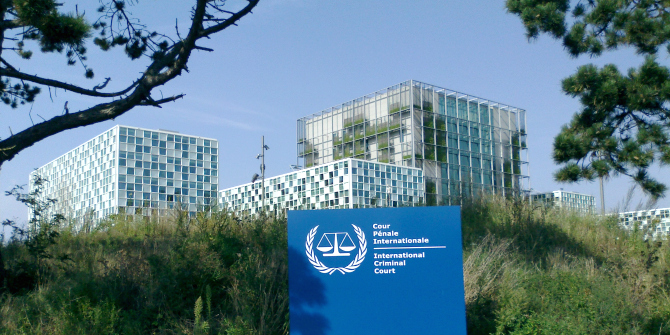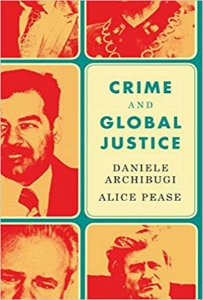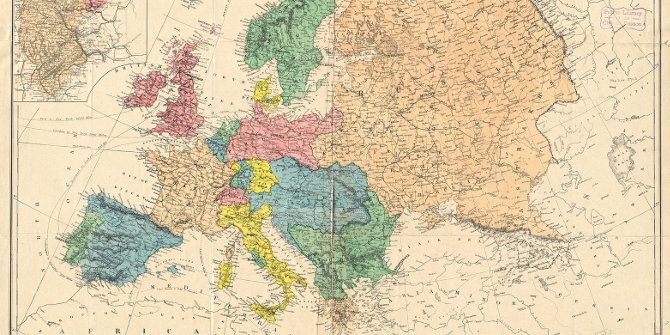In Crime and Global Justice: The Dynamics of International Punishment, Daniele Archibugi and Alice Pease delve into the hypocrisies and failings of international justice projects. Their book offers a timely reminder that the current international justice regime has not offered a silver bullet for complex political problems, writes Teemu Laulainen.
Crime and Global Justice: The Dynamics of International Punishment. Daniele Archibugi and Alice Pease. Polity Press. 2018.
In the absence of truly cosmopolitan jurisdiction, international criminal justice has remained in the shackles of powerful political interests, even though law by its nature should strive towards categorical impartiality. This is the central conundrum addressed by Daniele Archibugi and Alice Pease in Crime and Global Justice: The Dynamics of International Punishment. Archibugi is a Research Director at the Italian National Research Council (INRC) and a Professor of Innovation, Governance and Public Policy at Birkbeck College; and Pease, a freelance researcher and a graduate of University of Edinburgh and University of Bologna. The former has an impressive back catalogue in the field of International Relations, while for Pease, Crime and Global Justice is a formidable debut.
The subtitle of the volume incorporates a zinger. All too often international justice comes across as the powerful punishing the weak by ‘turning [their] enemies into criminals’ (19) under the veil of legalism. An oft-heard critique of the International Criminal Court (ICC) is that nine out of ten of its investigations have focused on Africa, while the global heavy hitters are shielded from its jurisdiction. One only has to think of the Hague Invasion Act passed by the US Congress in 2002 to see the discrepancies here. If true impartiality remains unachieved, why would it not be more meaningful to talk about international punishment rather than international justice? In Crime and Global Justice, Archibugi and Pease dissect the politics of globalising law and show how political forces continue to influence judicial discretion and prevent prosecution altogether.
The book is divided into three parts. In the first section, Archibugi and Pease go through the history and evolution of international criminal justice. They lead the reader down a familiar road from the Congress of Vienna (1814-15) to the signing of the Rome Statute (1998) via the tribunals of Leipzig (1921), Nuremberg (1945-46) and Tokyo (1946-48). The authors examine the theoretical basis of universal jurisdiction and cosmopolitan criminal accountability, while acknowledging the real-life impact of international justice projects. The second part of the book centres on detailed analysis of well-known international criminal cases: the legal action against Augusto Pinochet; the trials of Slobodan Milošević and Radovan Karadžić at the International Criminal Tribunal for the former Yugoslavia (ICTY); the spectacular show trial of Saddam Hussein by the Iraqi High Tribunal (IHT); and the attempted prosecution of Sudanese President Omar al-Bashir by the ICC. The authors describe the political dimensions of these cases in rich detail.
 Image Credit: International Criminal Court, The Hague (OSeveno CC BY SA 4.0)
Image Credit: International Criminal Court, The Hague (OSeveno CC BY SA 4.0)
In exploring the case of Hussein especially, Archibugi and Pease demonstrate the perils of politically-driven justice outcomes. In 2006, the Bush administration pushed the IHT for a speedy resolution of Hussein’s case at the expense of a comprehensive inquiry into the crimes of the Ba’athist regime. This was done for the inevitable guilty verdict to be delivered prior to the US midterm elections that same year. The speed at which the IHT was assembled and the lack of cultural awareness in its make-up and conduct only served to escalate the sectarian tensions of Iraq. The result was a tragic farce to the highest degree.
In the case of the African rebellion against Omar al-Bashir’s indictment, the authors show how the biases of the ICC will inevitably erode the moral credibility required for upholding international (or indeed national) jurisdiction. The 2009 indictment of al-Bashir for war crimes in Darfur, and again for the crime of genocide the following year, sparked fierce criticism from the African Union and a wave of non-compliance to enforce the arrest warrant among African ICC members. The case shows that if the ICC is not able to prosecute high-profile cases outside the African continent, it risks appearing as yet another instrument of neo-colonialism.
Archibugi and Pease finish by proposing solutions for the current design flaws of international criminal justice. Their solutions vary from increasing the authority of the ICC through universal jurisdiction, to propping up the role of civil society engagement in international justice projects. The authors frame ‘justice from below’ in the shape of citizen initiatives and opinion tribunals as a way to pursue justice outside of the courtroom. The authors use the Russell Tribunal—in which a group of left-wing public intellectuals held a symbolic trial for American war crimes in Vietnam—as an apposite example of the latter. The Russell Tribunal bit deeply into the performative function of law by mimicking due process and ridiculed the international community for inaction over blatant human rights abuses. At the time, this symbolic trial drew much-needed attention to the US conduct of war in Vietnam and it has since been replicated in other contexts.
Crime and Global Justice is both well-written and thorough. Archibugi and Pease do a great job in conceptualising the often-confounding territory between international legalism and realpolitik—or the ‘hidden political complexities of international criminal justice’, as they themselves put it. The book is clearly laid out and includes multiple list-like elements, making it suitable for use as a textbook. The authors do not steer away from making normative statements and, at points, Crime and Global Justice reads almost like a government white paper. While the authors reveal themselves as advocates of liberal internationalism, they do not spare its central practices from piercing criticism. The result is a balanced and accessible exploration of theoretically complex subject matter: international justice; its history and future trajectories; its central concepts and debates. Crime and Global Justice is particularly well suited for both undergraduate and postgraduate students, or any reader venturing into the world of international justice for the first time.
Please read our comments policy before commenting.
Note: This article is provided by our sister site, LSE Review of Books. It gives the views of the author, not the position of EUROPP – European Politics and Policy or the London School of Economics.
_________________________________
Teemu Laulainen – King’s College London
Teemu Laulainen is a PhD candidate in War Studies at King’s College London. His own research focuses on the emergence of individual criminal liability for Class B war crimes.


 Find this book:
Find this book: 

